Search Results for Tag: environment
Climate champs – …fight climate change now, not in 10 years!
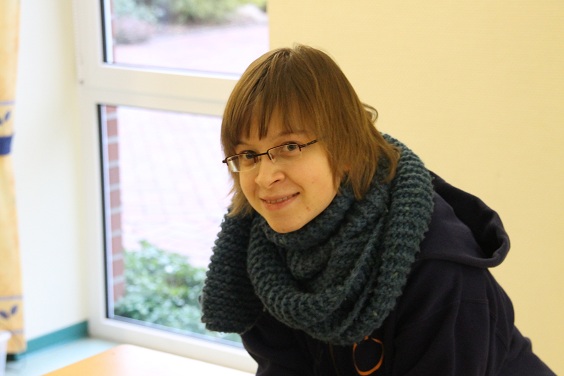 Do you feel responsible for our future? Are you tired of waiting for a breakthrough at climate conferences? If you are already taking action yourself, you are our ClimateChamp and we want to get to know you! Answer our questionnaire to become a part of our new blog series, take your chance to be nominated as a Climate Champ.
Do you feel responsible for our future? Are you tired of waiting for a breakthrough at climate conferences? If you are already taking action yourself, you are our ClimateChamp and we want to get to know you! Answer our questionnaire to become a part of our new blog series, take your chance to be nominated as a Climate Champ.
What is your name? How old are you? And where do you live?
My name is Anke Britta Schmidt. I am 18 years old and I live in Melle, which is a small city near to Osnabrück in Germany.
How does the climate change affect your everyday life in your community?
In Germany the climate change does not affect the everyday live very much. Maybe in the future prices for food will increase or the temperature will rise a bit. But it is not as dangerous as for people who live in Africa or Asia.
What trigger event led you to start fighting climate change?
For me starting to fight the climate change was a lucky coincidence. I found a note at the notice board in my school. A teacher was searching for pupils for his new study group. He wanted to train them to become climate ambassadors. I went to the first meeting and it sounded very interesting to me. So I enrolled for this course.
How exactly do you fight climate change?
I take part in the international youth project youthinkgreen (www.youthinkgreen.org). In this project we learn very much about climate change and things one can do against it. Every group has to work on a sustainable project. Our group from Osnabrück works with children at the age of 8 to 10 years. We talk with them about climate change and general things like rubbish. At the moment we teach them the topic energy. We meet the children once per week. During our last meeting we were able to have a look at an electric car. The children were allowed to take a short ride in the cars. They had a lot of fun. Our idea is showing children very early that our environment is very important to us and that we have to safe it. Some other members of our Osnabrücker group produce their own radio broadcast show once a month. In their program they talk about environmentally topics and present things that are good for the nature – like a solar tree to charge mobile phones. They also talk about other projects from youthinkgreen or criticize bad developments in politics or in the society. There is also another part of our Osnabrücker group that had created a shopping guide. They had a look at different shops and restaurants in Osnabrück and wrote texts about these shops where you are can to buy products that are produced eco friendly. This shopping guide will be published soon.
What do you say to climate change deniers?
We are not the only human living on the earth. We will have children and they will have children, too. When we destroy the earth today we steal our future and the future of our children. Today we use a lot of chemistry, for fracking for example. If you visit the places where fracking takes place, you can easily notice bad effects like sick people or burning water. These are the terrible consequences of pumping chemicals deep into the earth to get natural gas and oil. When you look at rivers for example you can easily measure changes. You only have to compare the ordinary water level from now with the water level from twenty or more years ago. Maybe we are able to convince climate change deniers to start helping the environment. By doing this, they may start believing in the climate change.
Worst case scenario: What do you think your city looks like 10 years from now, if no action had been taken to fight climate change?
There won’t be that many changes in Germany. In other parts of the world there will be much more problems: the sea level will rise, as well as the temperature. No human life will be possible in some parts. Maybe some refugees will come to Europe because they live in these parts of the world. This would lead to more social problems.
Best case scenario: What do you think your city looks like 10 years from now, if more and more action had been taken to fight climate change?
In Osnabrück there are plans that in 10 or 15 years there will only be electric or hybrid busses. There is also a campaign called “mobility 2030”. The aim of this campaign is that the people of Osnabrück change their city. They can make suggestions how these changes should look like. They can take photos, paint pictures, write letters or stories and film their ideas. All these ideas will be published on the campaign homepage.
Short and simple: What do you demand from your government as far as climate change is concerned?
I demand from my government that they convince countries like the United States, India and China to start to fight the climate change now, not in 10 years. If we want to save the world, there has to be taken action today not in some day in the future!
How can interested people take part in your project?
Interested people can search for a youthinkgreen group nearby or they can start their own group. If they don´t have enough time, they can participate in single activities of the groups.
All routes headed for Frankfurt
This is the third guest post as part of our series accompanying the WWF Youth Bike Tour this summer. Still having sore muscles from the previous day’s leg Tamara Nausner and her fellow cyclists lost little time to ride on to Frankfurt. It was the last stretch for our guest blogger.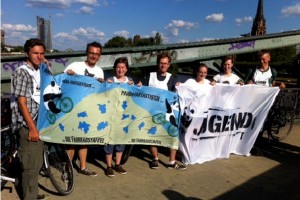
Today is a very special day. The bike tour really are two – one that traverses the country passing through the Eastern states, the other following a route in the West. But both will be merging at the end of today’s stretch. Filled with anticipation we are riding out of Wiesbaden, although our bodies hurt quite a bit. But: no pain, no gain. And after a while I get used to it and can enjoy the journey again along the river Main. I like the route more than the one yesterday because for the most part there is no road and no cars. At one point we even have an abandoned motorway all to ourselves. Some of us are cycling as fast as they can. We are all having fun.
We arrive at Frankfurt quite early. The riders from the Eastern route inform us that they will not be here for another few hours. To pass the time we treat ourselves to ice-cream, play cards and relax in the grass near the Main. Eventually the others arrive. Together we take a picture of the banners of the two teams now united.
For me and some of the others the bicycle relay is over now but the rest will ride on in the spirit of climate-friendly travel. I am so glad I took part and hope that there will be another tour next year. And I also hope that we could help encourage people to think about what they can do to protect our environment.
56 Kilometers turn strangers into friends
This is the second guest post as part of our series accompanying the WWF Youth Bike Tour this summer. Today Tamara Nausner tells us about her day on the road – and that 56 kilometers on a bike need not be the most taxing thing in a day of cycling…
My day starts very early in the morning. Too early. But today there is no time to be tired or lazy. So I’m packing all my luggage onto my bike and ride to the train station. It is so quiet and peaceful at this time in the morning.
Being a little late, my train eventually is on its way to Oberwesel – the starting point for today’s stage of the WWF Youth cycling tour.
What I learn along my journey is that there are no elevators at small stations, so I have to carry my bike up and down the stairs quite a few times. Not that easy with all the luggage.
At half past nine I arrive in the town, which is is located some 80 kilometers West of Frankfurt. I am very excited to meet the two cyclists, who will join me for the tour. And they don’t keep me waiting. I spot them immediately – they are wearing the vests carrying the WWF logo. Then they hand me one, too. Time for a picture of all of us! There is not much around; we eventually opt for an old ruin as a backdrop for our photo.
At last we start day 20 of our tour, which today will bring us to the city of Wiesbaden. But we are not the only ones on the road, framed by vineyards on one side and the river Rhine on the other. Unfortunately there are cars too. So after a while we decide to take a route through the vineyards. There are no other cyclists and no cars. Only a tractor. But very quickly we regret this idea because our path is steeply rising. Eventually we return to our previous route.
The weather is perfect: warm but not too hot, clouds and the sun take it in turns. We enjoy the journey. While riding we get to talk a bit, about everything, and I realize how nice it is to talk to people who have similar interests – protecting the environment being a very big one.
Our destination is getting closer. But before starting off on the final stretch we decide to take a break and have some lunch. That is when I notice for the first time just how tired I am. The rest of the trip is quite tough. Finally we arrive at the train station of Wiesbaden. But even after 56 kilometers on the bike there is no rest for us yet. A photographer is welcoming us, asks for our names and wants to take a couple of pictures. Then, he leaves.
A final short ride along a coarse gravel path to our night quarters turns out to be almost the hardest part of our journey today. But eventually we get there.
The next morning at 10am we are ready for the next leg of our tour. We take a picture and are on our way – to Frankfurt.
‘Hands off my sausage,’ say Germans to meat-free proposal
Rice and beans instead of sausages and meat? The very idea of eathing just vegetarian fare – even if it’s just once a week – has many meat-loving Germans up in arms. Find out why.
The whole kerfuffle began earlier this week with Germany’s opposition Green Party saying they planned to roll out a weekly vegetarian day if elected. Yes, Germany is in full campaign mode with six campaign weeks left until national elections.
So, what’s the fuss about? The Greens say one day each week, workplace cafeterias at federal government institutions would be banned from serving any meat dishes or products. The environmentally-friendly party hopes that would become a model for corporate and school canteens.The party says lower meat consumption would reduce the impact of farming on the environment, lead to an increase in quality and better conditions for animals.
“A veggie day is a wonderful day to try out how to nourish oneself without meat and sausage for once,” Green Party leader Renate Künast told mass-market daily Bild this week.
But, many think otherwise. Though environmental groups have welcomed the proposal, it’s sparked uproar in the country. Some lawmakers have said it smacks of a lecturing attitude. German Agricultural Minister Ilse Aigner was quoted through a spokesman that “we don’t place much stock in paternalism. At the end of the day, we need a balanced diet and meat is part of that.”
Meat certainly is a big part of German‘s lives. Estimates suggest that per capita meat consumption in the country per year is 60 kilograms (against a global average of 42 kg per-capita annually).
A recent United Nations study suggested people in the industrialized world should halve their meat consumption, saying the demand for ever cheaper meat is ruining the planet by leading to a massive expansion of intensively farmed livestock, diverting vast quantities of grain from human to animal consumption and requiring intensive use of fertilisers, pesticides and herbicides.
But many meat-loving Germans remain unconvinced. Members of the youth wing of the Free Democrats (FDP) even organized a spontaneous street barbeque this week in front of Green Party headquarters in Berlin. Some members held up slogans saying “Hands off my sausage.”
From gray to green – biking through Germany’s former industrial heartland
In the second part of our bike blog, Maurice Jurke, who’s part of the WWF’s bike tour across Germany, takes up the story as he encounters some strenuous uphill stretches (the good thing about those, as he points out, is rolling down), sweats it out in the summer heat and cycles through Germany’s former coal-fired industrial heartland which has now been rejuvenated into a green area.
It’s 3:20 pm and I am sitting in a small café in the inner city of Hamm in the western German state of North-Rhine Westphalia. It’s quite well known in Germany and so I expected a big town with and a landscape dominated by the color gray. But as so often this year, I was wrong. Instead, I cycled on a wonderful route from Gütersloh to Hamm.
During the day, I barely rode on streets since a large part of the stretch wound through fields and large forests. I began at 10:15 as usual and I had hoped to arrive after 60 kilometers and 3 1/2 hours. But again I was proven wrong. Literally. I took some wrong turns, and so I had to ride 70 kilometers over several mountains, and arrived after 4 hours. Still a good number, but I was not very happy with my day. It was too hot and I am really thankful for my ice cream and my ice-cooled coke which I’m sipping at the moment. Still, it was a good day, it just could have been better. Well, I hope you had a perfect day. Me? I’m going to take a bath to cool down some more.
Let’ s go gray…uhh I mean green
Another day of biking through Germany and the direction is still south-west. From Hamm, we passed Dortmund and Duisburg, and now we’re visiting Langengeld, a small village at the border of Düsseldorf.
In the last three days, we’ve cycled past plenty of places in Germany’s old industrial heartland in the west. It’s called the Rhein- and Ruhrgebiet in German. There you’ll find big industrial companies and lots of mines and old coal pits. As Germany tries to change its energy policy, increasingly moving away from fossil fuels and towards renewable energy, coal is no longer a big player.
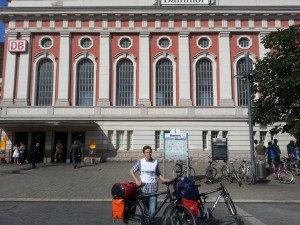 So you’ll find many old, abandoned and derelict coal mines. In some of these places, city authorities are trying to transform them into old people’s homes. Once gray and polluting, these unpopular mines are being upcycled and are a jewel in the inner cities.
So you’ll find many old, abandoned and derelict coal mines. In some of these places, city authorities are trying to transform them into old people’s homes. Once gray and polluting, these unpopular mines are being upcycled and are a jewel in the inner cities.
That means almost our entire bike route now goes through parks or forests, occasionally cut by some highways or an inner city. Germany, in this regard, has developed well, we think.
And here’s a personal question: what do you think of this development in Germany’s former industrial areas? Have the cities been successful? Would you want to live in this former gray area, which has now painted itself in green?





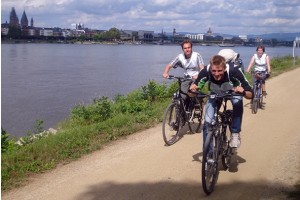
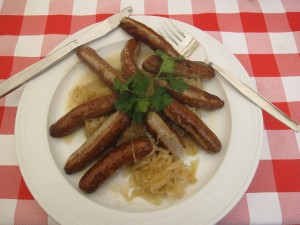
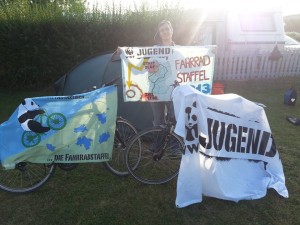




Feedback